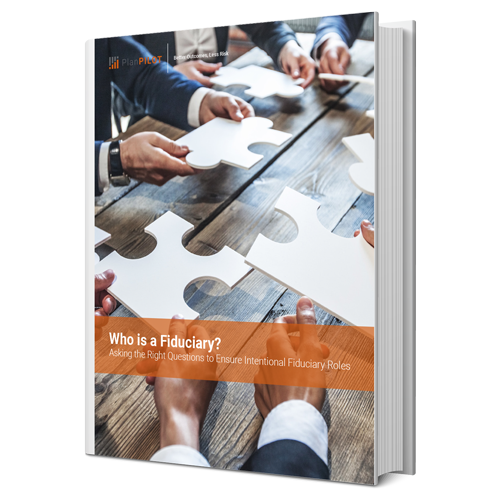Plan sponsors have to manage many moving parts in their retirement plans. Arranging plan options, managing compliance, increasing participation, educating participants and most importantly, adhering to fiduciary obligations can feel like an overwhelming responsibility. Due to the large amount of work in starting and maintaining their retirement plan, sponsors often overlook certain aspects that may expose them to potential liability. Additionally, some plan sponsors are unaware of the ongoing fiduciary duties which can result in misconceptions about the plan and its participants. These misconceptions can be costly, and sponsors may find themselves in trouble with the IRS or the Department of Labor.
Here are five common misconceptions plan sponsors have – and why they are likely wrong.
The Size of the Plan Determines the Likelihood of an Audit
It is natural, but incorrect, to assume that a plan with hundreds of millions of dollars in assets under management is subject to closer scrutiny than smaller plans. In reality, many factors can trigger an audit from the Department of Labor, most of which involve esoteric rules – and none of which are dependent on plan size. Audit targets can even be selected at random. Likewise, even if you are not selected for an ERISA plan audit, IRS auditors may ask to see plan documents and 5500s and could call-in a benefit specialist for any concerns.
It is always best for plan advisors to operate as if they will eventually undergo an audit.
Complaining Participants Can Be Ignored
Many employers who offer retirement plans make the mistake of thinking that they do not need to deal with the complaints of participants. After all, if they are compliant, participants have no grounds on which to stand. However, participant complaints can trigger audits or they may file lawsuits which can be expensive and time-consuming.
There is a strong precedent for plan participants bringing lawsuits against sponsors both individually and as class actions. Under ERISA, litigation has increased upon plan sponsors responsible for losses as a result of a failure to meet fiduciary responsibility. Excessive fee cases, for example, have risen sharply, with over 30 cases brought in 2017 alone. These cases, which allege that plan sponsors didn’t adequately protect participants from being charged excessively by plan providers, can be extremely damaging if found in favor of the plaintiff(s).
It’s important to reserve time for your participants to discuss any issues or questions and provide education to prevent further escalation.
The Investment Menu Does Not Need to Change
Sponsors wrongfully assume that the investment options they selected many years ago are still good and having a large investment menu qualifies as diversity. Under ERISA, it is a fiduciary duty to prudently select the plan’s investment options, and to monitor these options on an ongoing basis. This requires fiduciaries to periodically review, and when necessary, to replace their plan’s investments to ensure they are proper, sound and consistent with their Investment Policy Statement. Failure to meet this fiduciary requirement can result in personal liability to the plan’s losses.
It is best practice to review the plan’s investment menu at regular intervals, at least semi-annually, to examine investment performance and evaluate fees and expenses.
Good Intentions Trump Noncompliance
Particularly if your organization opts for a pre-approved plan, it can be tempting to assume that all compliance requirements have automatically been met. Although the plan you choose may have been compliant at one time, without constant oversight, it can easily become noncompliant.
Knowing the details of your service agreement is your responsibility as a plan sponsor. A failure to ensure that the terms of this agreement are carried out can result in a large fine from the IRS or DOL under ERISA. It is essential to be in regular contact with the providers of your plan to ensure that there are no changes or transitions that might make the plan noncompliant.
Another assumption that falls under this category is that ERISA liability goes away if participants choose their own investments from a robust mix of options offered within the plan. Unfortunately, fiduciary responsibility is not always transferred solely by the distribution of informational materials and updates on plan performance.
There is a spectrum of possibilities in the event of an audit, and your organization will fall closer to the “safe” end of that spectrum in the event of an audit if certain measures are in place. Among the best things that can be done to ensure participant success and protection from litigation are regularly reviewing investment performance, benchmarking fees and bringing on financial advisors to communicate with participants about their options.
Hiring an Advisor is Too Expensive or Not Necessary
The reality is that it might be more expensive not to employ a plan advisor. Qualified advisors, particularly those who focus on retirement plan consulting, are more knowledgeable with overall plan design and investment oversight. It’s also helpful to utilize fee-only advisors (vs fee-based), to be sure they have the best interests of participants at heart and to be involved in the planning process rather than broker-dealers with ambiguous incentives. Further, these professionals can provide guidance about the plan currently being offered. They might even point out certain red flags that would indicate a plan is underperforming or out of guidance by ERISA standards.
Let Us Help
If you are concerned about being able to effectively handle every task associated with sponsoring a plan, contact us today. Enlisting the help of a qualified retirement plan consultant is beneficial to plan sponsors and their plan participants. As an independent Registered Investment Advisor, PlanPILOT is not tied to any investment fund or record-keeper. We offer clients unbiased advice and assistance to control their retirement plan risks and deliver benefits effectively. Plan sponsors also rely on us to review fund lineups and provide scorecards of investments, highlighting any changes recommended. Feel free to contact us at (312) 973-4911 if you would like to learn how PlanPILOT can help with your retirement plan and plan participants.
|
Who is a Fiduciary? Plan sponsors need to carefully identify who its plan fiduciaries are and make sure those fiduciaries are aware of their role and properly trained. |
Related Posts
 Are You a Fiduciary? - If you make decisions that impact your organization’s retirement plan, you’re likely considered a fiduciary under ERISA. It is imperative that plan fiduciaries understand their… ...Read More
Are You a Fiduciary? - If you make decisions that impact your organization’s retirement plan, you’re likely considered a fiduciary under ERISA. It is imperative that plan fiduciaries understand their… ...Read More Key Components of an Effective Retirement Plan Committee - An organized, well-managed retirement plan committee is a key foundation of a successful retirement plan. Forming an effective retirement plan committee not only fosters more… ...Read More
Key Components of an Effective Retirement Plan Committee - An organized, well-managed retirement plan committee is a key foundation of a successful retirement plan. Forming an effective retirement plan committee not only fosters more… ...Read More Tips for Your Annual Retirement Plan Checkup - An annual review should be conducted to even the most well-crafted plan. Here are some helpful tips that can make your annual plan checkup as… ...Read More
Tips for Your Annual Retirement Plan Checkup - An annual review should be conducted to even the most well-crafted plan. Here are some helpful tips that can make your annual plan checkup as… ...Read More

